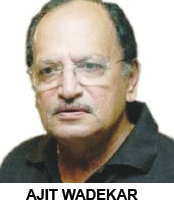 If one were to recount memories of an earlier generation, indulging (“excelling” would be an added motivation) in sports was both an imperative and matter of pride for parents. And lack of infrastructure was not necessarily a dampener as sports was a state of mind. But with the onslaught of technological innovations and subsequent gadgetisation of children’s minds, love for physical sports has diminished considerably within the parents and students communities.
If one were to recount memories of an earlier generation, indulging (“excelling” would be an added motivation) in sports was both an imperative and matter of pride for parents. And lack of infrastructure was not necessarily a dampener as sports was a state of mind. But with the onslaught of technological innovations and subsequent gadgetisation of children’s minds, love for physical sports has diminished considerably within the parents and students communities.
According to a recent media report, because of the increasing number of entertainment options as well as academic pressure, an abysmally low percentage (25 percent) of children play outdoors on a daily basis. Of the 75 percent who don’t play outdoors, 38 percent cited parental discouragement as the main cause.
With excessive focus on academics and intrusion of technology in our lives through social networking sites and other digital platforms, too many children are living a closeted life leading to severe physical and psychological problems at a young age. The kid next door’s virtual addiction is reading ‘danger’ in big bold letters. What’s even scarier is that parents are becoming very fussy about their little ones rolling in the muck while playing outdoors. Malls, multiplexes, game zones and food courts are becoming the new family entertainment destinations.
However, for the overall development of children and the national gene pool, it is essential that every child develops a sound mind and body. To ensure this, adop-ting and ingraining sports and outdoor activities as formal and structured subjects in schools is very necessary. Introducing kids to sports at an early age has many adv-antages. Locomotor (running and hopping), manipulative and non-manipulative skills (throwing, catching and balancing), as well as spatial awareness (awareness of self-space and boundaries) can be developed and improved through physical activity in schools.
In another study conducted by the Mumbai-based Indian Market Research Bureau (IMRB), the managements of 70 percent of schools surveyed were interested in outsourcing their sports curriculum to third party professional sports firms who could prescribe appropriate sports equipment, holistic curriculums, engage with children and administer structured sports education programmes. Typically, sports programmes include the scientific disciplines of physiology, psychology, nutrition and diet, biomechanics and performance analysis and embrace technology to deliver meaningful sporting experiences to children. Nevertheless few parents regard sports as a serious career option for children.
There are two primary pathways to a career in sports — in sports manag-ement, where one is not a sportsperson, but is entrusted with managing sports events or facilitating a sportsperson’s career by providing her with all support systems to succeed; and developing oneself into a sportsperson and earning a livelihood through performance in sporting events. Therefore in recent times, sports has emerged as a career option with tremendous opportunities for growth.
For business management graduates with experience of sports, the world offers a plethora of opportunities. From starting as an amateur player to transforming into a professional. For example, one can train to become an umpire, a referee, a coach or a physical instructor in educational institutions. Later on, one could work as an administrator or official in local sports organisations, either government or private. Those with an affinity for sports can also make successful careers in sports. The options available include sports journalism, physiotherapy, sports medicine and fitness training. Other areas they can branch out into are adventure sports and promotion of training centres and health clubs.
However, there is still a disconnect between India’s emerging sports manufacturing and management industries and academia. Therefore, there is a need to introduce formal courses in education institutions to nurture sportspersons and professionals who can take charge of sports marketing, advertising and sponsorship issues, and spectator, media and event management portfolios. What is needed is greater awareness of the emergence of sports as a career option (which needs to extend beyond the game of cricket, which enjoys high popularity) and the development of a pool of sports professionals including events and other managers to build a sports ecosystem.
In response to these demands, organisations have emerged to fill the gap. They aspire to inculcate a love of the outdoors using sports as a medium and provide structured curriculums to develop professional sportspersons and trained managers. India has ample manpower, talent and potential. All that’s required is to start acknowledging the role that sports can play towards building a healthy nation, and introduce sports education in elementary school, supporting it all the way in secondary and higher education. The beneficial fallout will be creation of a massive contingent of heroes and champions who will serve as role models for our youth.
(Ajit Wadekar is a former India cricket captain and advisory board member of KOOH Sports Pvt. Ltd)